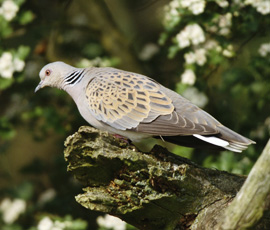VIDEO: Farmers fight to save turtle dove

East Anglian farmers are at the forefront of efforts by conservationists to save one of the UK’s most threatened birds from extinction.
The three-year project to reverse the decline of the turtle dove brings together farmers, the RSPB, Conservation Grade and the Pensthorpe Conservation Trust.
Numbers of the bird species have fallen dramatically in recent years and there now just nine birds for every 100 there were in the 1970s.
Once widespread across much of England and Wales, the species has been lost from many areas. It has remaining strongholds in East Anglia and south-east England.
The cause of the population crash is not fully understood. But the birds’ diet consists almost entirely of small seeds from wild plants which grow in crops.
Project partners and scientists are working with farmers in turtle dove hotspots to establish plots of these seed-rich plants on their land.
Two of the farmers involved in the Operation Turtle Dove project are John and Ellie Savory, who farm at Highfield Farm, near Great Ryburgh, in north Norfolk.
“We have turtle doves on the farm already,” said Mrs Savory. “They are key because they allow organisations like Conservation Grade to see how well it can do in its natural environment.”
RSPB farmland bird advisor Simon Tonkin said: “Turtle doves are really struggling. After many years of decline we are facing the very real possibility of losing this beautiful bird from the UK.
“This new project will build on a lot of positive work which has already been done by farmers and conservationists.”
Factors that may be contributing to the decline of the turtle dove include illegal hunting in the Mediterranean as the species makes its annual migration.
Agricultural changes in African wintering grounds and the avian disease trichomoniasis – which is common in pigeons and doves – could also be contributors.
Mr Tonkin said: “We need a better understanding of the causes of this devastating decline.”
Tim Nevard, executive director of Conservation Grade and a Pensthorpe trustee, said the key to saving the turtle dove was to ensure the right nesting and foraging habitats on farms.
Captive turtle doves at Pensthorpe are being used to trial a number of seed mixtures to identify the most palatable and nutritious options – from breeding to fledging and beyond.
This would help farmers create the right forage habitats, said Mr Nevard.
“We will be working closely with Natural England, our nationwide farmer network and commercial partners to encourage widespread uptake of these habitats.”
